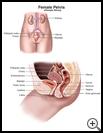
Endometriosis Discharge Information
What is endometriosis?
Endometriosis is when tissue that forms the lining of the uterus grows outside of the uterus. The uterus is the muscular organ at the top of the vagina. Babies grow in the uterus, and menstrual blood comes from the uterus.
The tissue most often grows around the ovaries, fallopian tubes, outside surface of the uterus, and lining of the pelvis. It may also grow in other areas, such as the bladder, rectum, or intestines. The tissue responds to the hormones of your menstrual cycle. It bleeds each month just like the lining of the uterus. However, when the tissue is not in the uterus, the blood has no way to leave the body. It can cause irritation, swelling, pain, and scar tissue. The scar tissue may cause organs to stick together.
Endometriosis can get worse as you get older until you reach menopause. It usually goes away after menopause. Symptoms can also get better with a pregnancy, but this improvement may not last. Endometriosis can make it hard to get pregnant.
How can I take care of myself when I go home?
How long it takes to get better depends on your treatment, how well you recover, your overall health, and any complications you may have. Treatment may offer some relief from the symptoms but there is not a cure. Endometriosis may come back or get worse after hormone therapy or surgery. The treatment depends on the severity of the endometriosis, your age, and your plans for having children.
Management
- Your provider will give you a list of your medicines when you leave the hospital.
- Know your medicines. Know what they look like, how much you should take each time, how often you should take them, and why you take each one.
- Take your medicines exactly as your provider tells you to.
- Carry a list of your medicines in your wallet or purse. Include any nonprescription medicines and supplements on the list.
- Talk to your provider before you use any other medicines, including nonprescription medicines.
- Your provider may prescribe medicine to:
- Treat pain
- Block hormones that help endometrial tissue to grow and bleed
- Your provider may recommend other types of therapy to help relieve pain, other symptoms, or side effects of treatment.
- If you have had surgery, to care for your surgical wound:
- Keep your surgical wound clean.
- If you are told to change your dressing on your surgical wound, wash your hands before changing the dressing and after disposing of the dressing.
- Follow activity restrictions, such as not driving or operating machinery, as recommended by your healthcare provider or pharmacist, especially if you are taking pain medicines.
- Keep a careful record of your symptoms, including any time lost from work, school, or leisure activities. Report the symptoms to your healthcare provider.
- To help ease your pain:
- Take warm baths (after your provider tells you it's OK to take a bath if you've had surgery).
- Get plenty of rest.
- Wear loose clothing.
- Use a hot water bottle or heating pad on your abdomen.
- Avoid constipation by increasing the fiber in your diet.
- Do relaxation exercises.
- Take care of your health. Try to get at least 7 to 9 hours of sleep each night. Eat a healthy diet and try to keep a healthy weight. If you smoke, try to quit. If you want to drink alcohol, ask your healthcare provider how much is safe for you to drink. Learn ways to manage stress. Exercise according to your healthcare provider's instructions.
Appointments
- Follow your provider's instructions for follow-up appointments.
- Keep appointments for any testing you may need.
Talk with your provider about any questions or concerns you have.
Call your healthcare provider if you have new or worsening:
- Pelvic, back, or buttock pain that starts just before or during your menstrual period
- Very painful menstrual cramps
- Abnormal or heavy menstrual flow
- Pain during sex
- Painful bowel movements, diarrhea, constipation, or other intestinal problems during menstrual periods
- Pain or burning during urination
- Urgent need to urinate often
- Signs of infection around your surgical wound. These include:
- The area around your wound is more red or painful
- Your wound area is very warm to touch
- You have blood, pus, or other fluid coming from the wound area
- You have a fever higher than 101.5° F (38.6° C)
- You have chills or muscle aches
- Trouble getting pregnant
Last modified: 2016-01-28
Last reviewed: 2016-01-26

